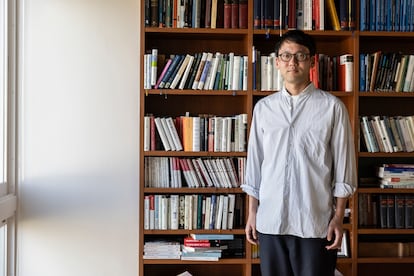Kohei Saito, philosopher: ‘Spending so much money, effort and time on going to Mars is stupid’
The Japanese thinker is a phenomenon in his country. A proud Marxist, he thinks that we should ban the use of private jets and space shuttles

Philosopher Kohei Saito (Tokyo, 1987) is a Marxist phenomenon in Japan. In his country, the original edition in Japanese of Slow Down: The Degrowth Manifesto has sold more than a half-million copies. His books synthesize investigations in which he ties together Marxism and environmentalism. “In the U.S., but also in Spain, the term communism has negative implications. Something similar takes place in Japan,” says Saito in his office at the University of Toyko, where he is an associate professor and “the only” specialist in Marxism. He has also published Karl Marx’s Ecosocialism: Capital, Nature, and the Unfinished Critique of Political Economy.
He doesn’t think Marxism is antiquated. His ex libris is a fine stamp of a caricature of himself standing next to Karl Marx, seated. After the Fukushima nuclear disaster, Saito began to pay attention to the environmental consequences of capitalism. And he wondered how Marxists should deal with ecological disaster.
Question. Where do you start?
Answer. We are 8 billion people, much more materialist than before, in the midst of an ecological crisis whose primary cause is capitalism. There are sectors of society that say, with a certain simplicity, that technology will solve everything. But we cannot develop continuously and growth is no longer feasible, especially in the Global North. To get over capitalism, we need something that goes further. The situation is tough. And only human beings can stop this crisis. If we don’t, the planet will be completely changed for millennia. It is an ethical and moral responsibility.
Q. The environment has entered into the so-called “culture war.”
A. Yes, but at the same time, societal perception with respect to the climate crisis has matured. When the former Spanish minister Alberto Garzón recommended reducing meat consumption, a kind of degrowth, a campaign sprang up against him. A big step forward: not long ago, we could not imagine political leaders defending this. At the same time, a reactionary attitude emerges; a response from the extreme right and conservatives who feel threatened by criticism of meat consumption and cars. The majority of the population is concerned about the environmental crisis, but also about giving up things they once took for granted.
Q. Does that cause anxiety?
A. We are in a chronic state of emergency. The pandemic was not the last crisis, but rather the beginning of more problems. We should not forget that moment [during lockdown] when, consciously, we halted capitalism. It seemed impossible. But it happened. For a short time. A good moment to establish some distance: people came back more anti-capitalist and inclined towards degrowth. Let’s remember that.
“The majority of the population is concerned about the environmental crisis, but also about giving up things they once took for granted.”
Q. What is your proposal for the future?
A. I talk about a degrowth communism: a society that adapts to the limits of nature and offers universal access to education, health, transportation, internet… Due to a variety of crises, access to these services — the common good — has been undermined for many. But without positive visions of the future, there will be more and more discontent. What we need is to build a broad movement: environmentalist, working-class, feminist, Indigenist… To propose an inclusive and emancipatory future.
Q. Is capitalism making us bitter?
A. We live absorbed by the system; often alienated, poor, indebted by loans, suffocated by rent, without medical coverage… Once in a while people enjoy, perhaps, watching Netflix; going to a concert or shopping. Opium. We need to realize that another kind of happiness is possible; another society; another life more enriching, joyful and linked to nature. We would have to establish what is necessary and what is not.
Q. What is not?
A. Private jets. The majority of us will never use one. They only benefit a few super-rich people who, in addition, utilize them as a status symbol as they destroy the planet. No matter how much money they have, the rich are not allowed to do that. We should ban their use. There are many things that can be restricted. We should start cataloging unnecessary things and then, ban them. In the 21st century, the important thing is not if it contributes to the GDP, but rather that it is sustainable, just, and promotes human welfare.
Q. In your public appearances, do you defend these ideas?
A. I try to reach out to the public. Currently, I am the only relatively young and explicitly left-wing talk show host. I consider it important to make these positions visible in mass media; otherwise, that space will be occupied by the right. The younger generations are more open; it is a good moment to mobilize them towards the left. The situation is precarious; we have to be careful. The existing parties don’t always offer a convincing alternative. That may be favorable to the resurgence of Marxism.
Q. There are Marxists who deny the connection you make to environmentalism.
A. Marx read and took notes. In those notes, he talks about how nature, in the 19th century, was already being destroyed, criticizing capitalism’s destruction. When Marx died, Engels edited the volumes and emphasized the idea that socialism can improve the lives of all, especially the working class. His dissertation became optimistic regarding technological progress. It eclipsed Marx’s ecological ideas.
Q. Does it seem to you that this techno-optimism is still present, for example, in the galactic ambitions of multimillionaires?
A. The Anthropocene signifies that humans have become a geological force, with the ability to modify the planet. But not everyone is equally responsible for this situation. It’s primarily the people of the Global North; particularly, the super-rich who think they can do it all with their money, even flee the Earth. That idea of conquest originates with European colonialism, linking imperialism, capitalism and progress. We should also restrict space shuttles, like SpaceX. Spending so much money, effort and time on going to Mars seems stupid to me; we should invest that energy in saving our planet. As a philosopher, I’m an optimist. Our perception, our values, can change in two or five years. Opportunities for change are everywhere. I want to explore what they are.
Sign up for our weekly newsletter to get more English-language news coverage from EL PAÍS USA Edition
Tu suscripción se está usando en otro dispositivo
¿Quieres añadir otro usuario a tu suscripción?
Si continúas leyendo en este dispositivo, no se podrá leer en el otro.
FlechaTu suscripción se está usando en otro dispositivo y solo puedes acceder a EL PAÍS desde un dispositivo a la vez.
Si quieres compartir tu cuenta, cambia tu suscripción a la modalidad Premium, así podrás añadir otro usuario. Cada uno accederá con su propia cuenta de email, lo que os permitirá personalizar vuestra experiencia en EL PAÍS.
¿Tienes una suscripción de empresa? Accede aquí para contratar más cuentas.
En el caso de no saber quién está usando tu cuenta, te recomendamos cambiar tu contraseña aquí.
Si decides continuar compartiendo tu cuenta, este mensaje se mostrará en tu dispositivo y en el de la otra persona que está usando tu cuenta de forma indefinida, afectando a tu experiencia de lectura. Puedes consultar aquí los términos y condiciones de la suscripción digital.









































